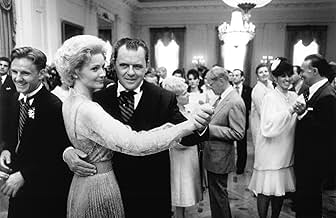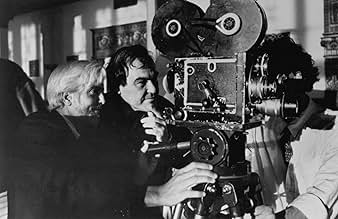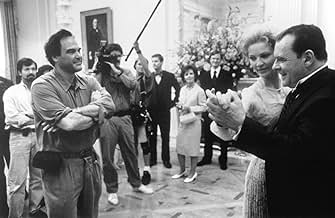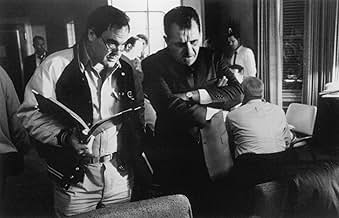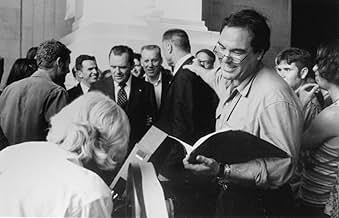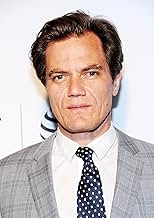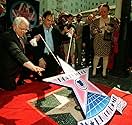A vida e trajectória política de Richard Nixon, desde a sua infância até à eleição para Presidente dos Estados Unidos da América, para dois mandatos e uma amarga queda em desgraça, após o es... Ler tudoA vida e trajectória política de Richard Nixon, desde a sua infância até à eleição para Presidente dos Estados Unidos da América, para dois mandatos e uma amarga queda em desgraça, após o escândalo Watergate e a sua renúncia ao cargo.A vida e trajectória política de Richard Nixon, desde a sua infância até à eleição para Presidente dos Estados Unidos da América, para dois mandatos e uma amarga queda em desgraça, após o escândalo Watergate e a sua renúncia ao cargo.
- Direção
- Roteiristas
- Artistas
- Indicado a 4 Oscars
- 11 vitórias e 18 indicações no total
- Direção
- Roteiristas
- Elenco e equipe completos
- Produção, bilheteria e muito mais no IMDbPro
Avaliações em destaque
Oliver Stone's direction is nothing short of a miracle. As in his 1991 masterpiece, JFK, he has a lot of different characters to bring to life on the screen. He helps his actors fashion their performances with miraculous accuracy. Paul Sorvino is dead-on as Henry Kissinger, as is Joan Allen as Pat Nixon, and Bob Hoskins as the mysterious, mean-spirited J. Edgar Hoover.
The writing is also represents a triumph. Stone and co. are able to synthesize entire pages of historical prose into digestible chunks of dialogue. Aspiring screenwriters should seriously take note.
Although 1995 also saw the likes of Casino, Seven, Heat, and The Usual Suspects, Nixon is the ultimate champion. History on screen has rarely been this exhilarating.
Another reason to see this film is the brilliant, absolutely overwhelming lead performance by Anthony Hopkins; his Nixon may not look or sound exactly like the 37th president (but come on, except maybe for Ed Sullivan, who does?) but he embodies his qualities - strengths as well as weaknesses - to such an enormous degree that he simply BECOMES Nixon, at least for the three hours the movie is on screen.
I have to say, though, I was not nearly as impressed as every one else (critics and general audiences alike) seems to be about Joan Allen as Pat Nixon. It's nothing against her performance, she did fine, it's just that as written, the part is rather weak. In fact, I was much more bothered about the liberties the filmmakers took in fleshing out her character than in all the political events; it's like, whenever they wanted to have someone blast Nixon or act as his conscience, they'd trot out Ol' Pat, giving her some of the most embarrasingly "speechified" moments in all of the movies - almost none of their scenes together ringed true as husband as wife; it was more like Nixon sitting across from the Filmmakers' Conscience. In fact, she's angry at him so often in the film you have to wonder, what exactly does she love about the man? The film never answers (or attempts to answer) this question.
But this one minor quibble is not enough to make me downgrade this film. It is an absolutely stunning achievement by any stretch of the imagination, and it contains some interesting thematic and technical echoes of both Citizen Kane (cavernous high ceiling scenes, a "March of Time"-type newsreel on Nixon, a dinner scene between Dick and Pat at a long, impersonal table) as well as The Godfather (the burnished, half-dark half-light cinematography, several "chamber of power" scenes in tight, dark and claustrophobic rooms)that I found, in context, to be totally appropriate. It paints both Nixon and the times he (and the country) lived through on a grand and mythic scale that was truly awesome and, once again, entirely appropriate. Yes, it's a film that is at times big, loud and bombastic (because so, after all, was Nixon himself) but, just as often quiet, contemplative and told at an achingly *human* level. The contrast between these two states is what gives the film a good deal of its overall power and, as I've said, I never would have believed that Stone would have been capable of doing the smaller, quieter scenes so well.
This is a good film to have on tape or DVD, for two reasons. It's so long, and so dense with facts, characters and events, that you're not likely to want to watch it all the way straight through (the first time I saw it was in the theater and though I was held spellbound, I began wishing for an intermission at about the two-hour mark, not so much to stretch my legs but to give my brain a chance to process all I'd seen and heard so far). Also, and more importantly, the videotape includes after the credits two scenes cut out of the final film for time purposes. In both cases, I believe, a severe mistake was made - these are both, I believe, ESSENTIAL sequences; not just nice to have as an additional bargain, but scenes which Stone should have fought tooth and nail to keep in (even cutting out some others if he had to - my vote would have been to excise a few of those Pat Nixon scenes instead). Once scene involves Nixon's visit to the CIA and another a discussion between Nixon and J. Edgar Hoover in the Oval Office. The first scene is a masterpiece of writing and acting (with Sam Waterston as CIA Director Richard Helms, otherwise in no other scene of the movie) and the other is, I think, key in understanding Nixon's motivation to begin taping his White House conversations in the first place (also - an issue which is touched on no other place in the movie). I feel that these two scenes should be edited back into their appropriate places in the movie; seeing them separated from the rest of the film is better than not seeing them at all, but they really belong as part of the entire story.
Theodore Roosevelt, Washington, Kennedy and (most of all) Lincoln look down from the White House walls at Nixon, their solemn portraits hovering like admonishing ghosts over the Watergate squalor. In life, Roosevelt was bold and self-assured, whereas Nixon dithers: Washington's self-effacing propriety confronts a Nixon who is suggesting that the Nazis were right. Kennedy is everything that Nixon could never be - above all else, at ease with himself. Lincoln looks down, from the office wall and from his marble seat in the Memorial, in silent rebuke as his successor debases the presidency.
Some of the camera tricks don't work. We see Nixon rooted to the spot at Love Field as the camera soars up and away from him. Why? Obtrusive camera movement is justified only if it adds to our understanding of character or plot. This shot seems to have been included merely for its cleverness. The same is true of the little flashes of black-and-white which keep interrupting the action. At one point, in a dialogue between Nixon and Haldeman, the focus is un-subtly and repeatedly thrown from one man to the other. What does this achieve? Is some artistic goal being pursued, or are the effects included for their own sake? What is the symbolic importance (if any) of the vanishing racehorses?
Much of the attention to detail is of a very high order. Stone's writing team has done its homework, and we get authentic touches such as Nixon's love of log fires, which meant having to run the White House air conditioning system at full blast during summer. The reconstructions of the White House interiors are superb. We see Nixon and Pat engaging in a domestic scrap beneath murals of more edifying battles like Yorktown and Saratoga. Historical events, recorded on news film at the time, are brilliantly reconstituted, replacing the real Nixon with the Hopkins version. Thus we get convincing reconstructions of the Kennedy TV debate and the 1962 'retirement' speech. Young Nixon's courtship of Pat is narrated without dialogue as a grainy, jumpy home movie - and is beautifully done. I did not feel quite so positive about the Alger Hiss segment. Welles did this 'newsreel flashback' idea in "Citizen Kane" more than half a century earlier, and did it with such flair that anything which follows is sure to look jaded. It also seemed to me that this passage is badly-placed, coming immediately after the 1962 California defeat.
James Wood plays Bob Haldeman, and does his usual admirable, photogenic best. My quibble with the characterisation is, this isn't THE Haldeman. The historical personage was grimmer, more stately, more formidable (Fred Emery's "Watergate" bears this out). Wood is restricted here to the role of an aide, rather than the Chief of the White House Staff, an emperor within his own (not inconsiderable) domain.
Pat Nixon does not ring true either, but for different reasons. Joan Allen is more than competent as the steely, astute power behind the Nixon throne. The fault is in the characterisation rather than the actor. The real Pat was (so far as one can judge) an altogether less articulate, less philosophical, less knowing individual. Watch her in the REAL "Checkers" broadcast - she is a stiff, repressed, passive woman, a true 1950's Republican wife, not the power broker that this film would have us believe. It is hard to accept, for example, that Nixon's decision to retire in 1962 was his wife's diktat.
There are elements of this otherwise excellent film which simply don't work. Would the President of the United States REALLY be pulled out of a face-to-face meeting with Brezhnev to deal with some Watergate minutiae? The real-life Mitchell said that he tolerated Martha's indiscretions "because I love her". This touching declaration is cheapened in the film, for no good reason. Similarly, Tricia Nixon's exchange with her father was, in real life, an assertion of unconditional loyalty which was both moving and very much to Nixon's credit. The film version has her asking sceptically, "Did you cover up?" This is quite wrong. The Nixon women would have considered it treachery even to frame such a question.
John Williams' epic score is in keeping with the classical tragedy acted out before us. Nixon's tearful prayer with Kissinger and the farewell speech to the White House staff are scenes of extraordinary power.
Paul Sorvino gives us a marvellous Kissinger, though in my humble opinion Stone goes too far when he makes Kissinger the White House 'leaker' and accuses the Secretary of State of complicity in the Watergate break-ins.
One scene which works splendidly is the (true) incident at the Lincoln Memorial. Nixon tries to glad-hand the indignant youngsters, using the hearty, patronising approach of a bygone generation. The sad revulsion of the protesters shows the gulf between Nixon's consciousness and the spirit of the age.
"I hope I haven't let you down" is uttered one single time by Nixon, towards the end of the film. The truth is, he hit on this formula of words and used it again and again during the final days of his presidency. It was a last desperate attempt to tweak our sympathy-nodes. As such, it was utterly gauche, utterly craven, utterly guileful, yet utterly unrealistic. In fact, utterly Nixon.
Nixon is seen as a troubled figure, insecure and paranoid, with few friends. An unhappy childhood, in which he refers to himself as his mother's "faithful dog," in fact does dog him his whole life, as he seeks to please a demanding ultra-religious mother (Mary Steenburgen)who had already died by the time he took office as President, but whose memory and expectations lived on. Nixon is burdened with an unhappy marriage to Pat (Joan Allen) - unhappy largely because of his own obsession with political success - and haunted by the ghost of John Kennedy, who defeated him for the presidency in 1960 and who Nixon could never live up to. Kennedy was loved; Nixon was hated - he could never get over that. A scene near the end of the movie demonstrates his feelings toward JFK as he looks at Kennedy's White House portrait: "They look at you and see what they want to be; they look at me and see who they are."
Although the movie - as any review of Nixon's life will - revolves around Watergate, it provides a fascinating summary of his life, and of what added up to make him the troubled and lonely figure he really was. There's also typical Oliver Stone material as dark hints of conspiracy extending far beyond Watergate are inserted. Perhaps the most unsettling being a meeting Nixon has shortly before JFK's assassination with some supporters in Texas who are trying to convince him to run for the presidency again in 1964. Nixon protests that Kennedy can't be beaten in '64. A Cuban American present says ominously "What if Kennedy doesn't run in '64?"
A truly fascinating portrayal of a fascinating man, even in the end somewhat sympathetic to Nixon as the film ends with his 1994 funeral service, some comments at that service by President Clinton and a summary of his career by a narrator pointing out his accomplishments. A last note: kudos to Paul Sorvino, who hit Henry Kissinger bang on.
8/10
Great cast. Hopkins is a hard working star. What a shame he lost to the Hoffman aper Cage. And Nixon? What a loser. What a terrible insufferable tragic loser. It surely was a challenge to do this for Hopkins.
The biggest most significant detriment is of course one knows not where fact ends and fiction begins. Stone doesn't exactly have a reputation for avoiding hyperbole.
But taken as a personality portrait it's devastating. You might know your history but you've probably never imagined things were like this. You could have imagined them if you'd taken the time, but this movie brings you there.
It's just a tragic movie about an extraordinarily tragic figure. Stone brought you Salvador where he showed how well he knows the art of movie making; he brought you the screenplay for Scarface; and so forth. He can do it, whether or not he goes too far on some occasions. The movie production itself is very good.
And it's a long one. It's not a popcorn movie. It's extremely depressing and frightful. A look into one very weird pathology. But a 7 out of 10 is not out of order.
Você sabia?
- CuriosidadesWriter, producer, and director Oliver Stone said he voted for Richard Nixon in 1968, based on his pledge to end the Vietnam War.
- Erros de gravaçãoThe film shows Nixon signing his resignation letter the day before he leaves office and prior to it being publicly announced. Historically, Nixon informed the nation in an address the night before leaving office, and then signed the letter the next day, which was his last morning in the White House.
- Citações
Richard M. Nixon: [to a portrait of Kennedy] When they look at you, they see what they want to be. When they look at me, they see what they are.
- Cenas durante ou pós-créditosSecond opening credits: "For what is a man profited, if he shall gain the whole world, and lose his own soul?" Matthew 16:26.
- Versões alternativasLetterbox video version features additional outtake footage, including a scene starring Sam Waterston as CIA director Richard Helms.
- Trilhas sonorasMenuetto
from Schubert's "Symphony No. 2 in B Flat Major, D 125"
Written by Franz Schubert
Performed by Koninklijk Concertgebouworkest (as Royal Concertgebouw Orchestra)
Nikolaus Harnoncourt, Conductor
Courtesy of Teldec Classics International GmbH
By arrangement with Warner Special Products
Principais escolhas
- How long is Nixon?Fornecido pela Alexa
Detalhes
Bilheteria
- Orçamento
- US$ 44.000.000 (estimativa)
- Faturamento bruto nos EUA e Canadá
- US$ 13.681.765
- Fim de semana de estreia nos EUA e Canadá
- US$ 2.206.506
- 25 de dez. de 1995
- Faturamento bruto mundial
- US$ 13.681.765
- Tempo de duração3 horas 12 minutos
- Cor
- Mixagem de som
- Proporção
- 2.39 : 1
Contribua para esta página



